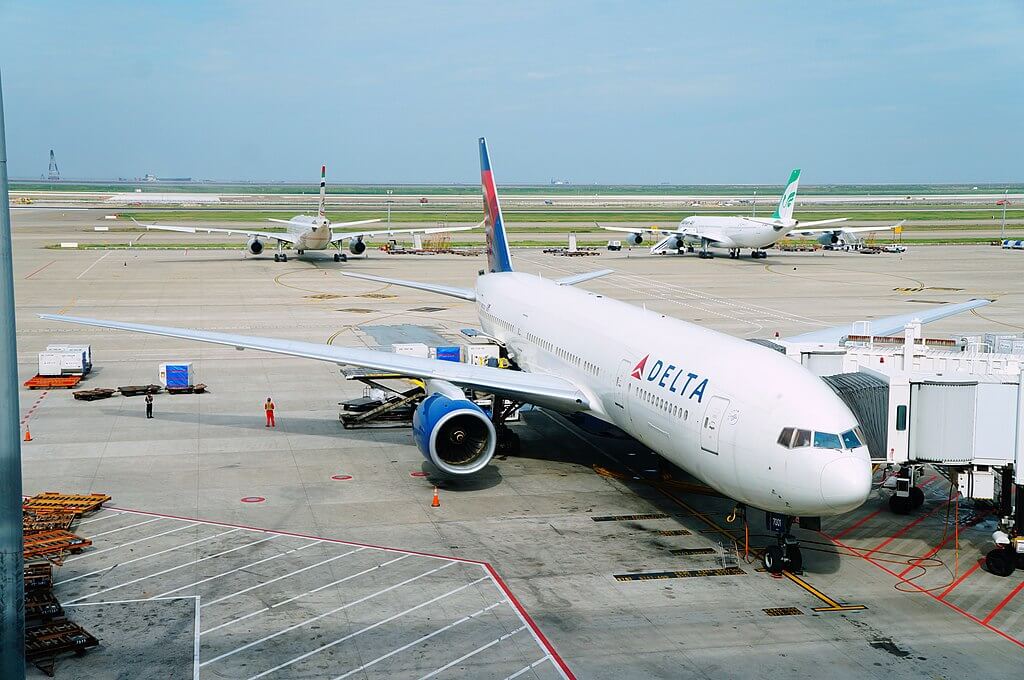Image Courtesy: Delta Air Lines Flight 89 – Simple English Wikipedia, the free encyclopedia (representation purpose)
Pittsburgh, PA – October 27, 2025 – A critical lapse in routine safety protocols led to significant disruption at Pittsburgh International Airport (PIT) this past Saturday, October 26, when an emergency evacuation slide was accidentally deployed on a Delta Air Lines Airbus A220. The incident, involving a flight attendant, halted preparations for Delta Flight 3248 bound for Salt Lake City and is projected to incur substantial financial costs for the airline, impacting numerous travelers.
The Incident Unfolds: What Happened
The event occurred as Delta Flight 3248 was stationed at Gate D2, undergoing standard pre-departure procedures. As flight crews initiated the arming sequence for the aircraft doors—a safety measure that prepares the slides for emergency deployment upon opening—a seasoned flight attendant, reportedly with over two decades of experience, mistakenly operated the handle of the forward left-hand door (1L). Crucially, this door was still in its armed state. The aircraft’s design dictates that an armed door, when opened from the interior, automatically triggers the rapid inflation of the emergency evacuation slide.
Given that the aircraft was connected to the jetbridge at the time, the large, orange slide immediately deployed and inflated against the boarding ramp. This unforeseen blockage rendered the door unusable and prevented safe boarding or de-boarding until ground personnel could address the situation. Passengers on board experienced a period of uncertainty as the issue was assessed and resolved.
Immediate Aftermath and Passenger Impact
The accidental deployment brought the flight’s departure to an abrupt halt. Ground crews and airport staff worked diligently to manually detach the deployed slide and re-establish the integrity of the jetbridge connection. This process alone reportedly took approximately an hour. Consequently, the flight’s scheduled 5:30 p.m. departure was pushed back significantly, with the aircraft eventually departing at 9:11 p.m. local time.
For many passengers, the four-hour delay was just the beginning of their ordeal. A substantial number missed their connecting flights in Salt Lake City, leading to unexpected overnight stays, rebooking complexities, and further interruptions to their travel itineraries. The incident underscores how a single operational misstep can cascade into widespread inconvenience for travelers.
The Financial Toll: Estimated Costs and Damages
Accidental slide deployments, while relatively uncommon, carry a hefty price tag for airlines. Industry estimates suggest that replacing a new emergency evacuation slide for a narrow-body aircraft like the Airbus A220 typically falls within the range of US $50,000 to $70,000. Even in scenarios where a slide can be carefully deflated, inspected, and repacked rather than fully replaced, the specialized service, re-certification, and manufacturer fees can still accumulate to between $20,000 and $30,000.
Beyond the direct costs of equipment, airlines face additional expenses related to operational disruptions. These include accommodating stranded passengers (meals, hotels), rebooking fees, potential compensation, crew repositioning, and the revenue loss from an aircraft being temporarily taken out of service. When all these factors are aggregated, the total cost to Delta Air Lines for this incident could easily escalate into the six-figure range.
Industry Context: Inadvertent Slide Deployments (ISDs)
These types of events are formally recognized within the aviation industry as “Inadvertent Slide Deployments” (ISDs). While each incident is unique, internal estimates from aircraft manufacturers, such as past data from Airbus, have suggested that ISDs could occur globally several times a day across their entire fleet.
ISDs are often more frequently reported during the arrival phase of a flight, when doors are typically disarmed. However, as demonstrated by the Pittsburgh incident, the risk persists during pre-departure arming procedures. The fundamental cause is almost always human error—an unintentional activation of a door handle when the slide mechanism is armed.
Safety Implications and Prevention Measures
The danger posed by ISDs extends beyond financial losses. An uncommanded slide deployment can pose a risk of injury to ground personnel, damage jetbridges or other ground service equipment, and, critically, cause significant logistical disruption that impacts multiple flights and airport operations.
Airlines rigorously train their flight crews on door arming and disarming procedures, emphasizing the importance of verbal and physical cross-checks. Some carriers have adopted advanced safety methodologies to further mitigate human error. For instance, one UK carrier famously implemented the Japanese “Shisa Kanko” method, where personnel verbally call out and physically point to each step in safety-critical routines. Studies have indicated that this meticulous approach can reduce human error rates by up to 85%. This reinforces the idea that even highly trained individuals can benefit from enhanced procedural discipline in high-stakes environments.
Human Factors and Lessons Learned
The Pittsburgh incident serves as a poignant reminder that even highly experienced professionals are susceptible to momentary lapses in concentration or routine. As one former flight attendant commented regarding such events, “You can lose situational awareness when you most need it. Safety design intentionally prioritizes fast evacuation in true emergencies—even if it means rare but expensive mistakes like this one.” Factors such as fatigue, distraction, or the pressures of maintaining tight schedules can all contribute to such human errors. The involved flight attendant reportedly expressed deep regret and apologies for the mistake.
Local Perspective: Insights from Pittsburgh
For local aviation professionals in Pittsburgh, the incident underlines the ongoing vigilance required in the industry. “It’s a reminder that working in the cabin is a constant balance between efficiency and safety. Errors can happen—even to the best of us—so robust procedures and supportive teamwork are key,” remarked a Pittsburgh-based aviation safety trainer, speaking anonymously to discuss internal industry perspectives. “These events are thoroughly investigated, not to place blame, but to learn and refine protocols, making the system even safer.”
What Remains Unconfirmed
As of this report, Delta Air Lines has not issued an official public statement detailing the full cause, the precise financial cost, or any specific remedial actions they plan to take.
The exact contractual arrangements for slide replacement/repair (e.g., covered by warranty, insurance, or direct airline cost) have not been publicly verified.
Whether the deployed slide will be completely replaced or if it can be repaired and repacked remains unconfirmed.
It is unclear if Delta will implement specific operational changes at Pittsburgh Airport or roll out broader procedural updates across its network as a direct result of this incident.
Conclusion
The accidental emergency slide deployment at Pittsburgh International Airport on Saturday underscores the delicate balance between complex aviation systems and human interaction. While a rare occurrence, such an incident rapidly escalates beyond a simple mistake, leading to significant financial burden for airlines and considerable inconvenience for passengers. The event reinforces the critical importance of rigorous training, stringent adherence to safety protocols, and continuous learning within the dynamic, high-stakes environment of commercial aviation.




